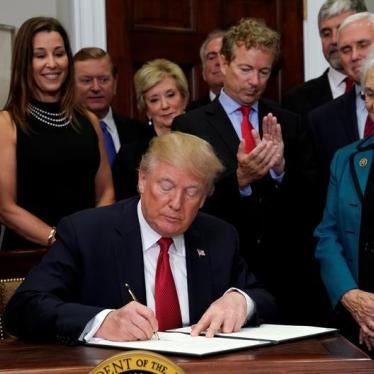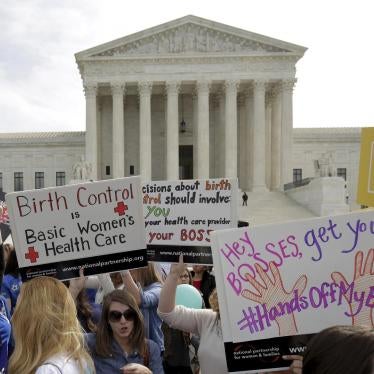February 21, 2018
Representative Frank Hoffman
Chair, Health and Welfare Committee
Louisiana House of Representatives
900 N. 3rd Street
Baton Rouge, LA 70804
Re: H Bill No. 3: “Promotion of Work and Community Engagement in Medicaid Law”
Dear Representative Hoffman,
We are writing to express our opposition to Louisiana H Bill No. 3, the “Promotion of Work and Community Engagement in Medicaid Law.” [1] For the reasons set forth below, we are concerned that imposition of work requirements in Louisiana may result in loss of Medicaid eligibility and poor health outcomes, particularly for those with chronic illness and disability, older people, and LGBT individuals.
Human Rights Watch is an independent, non-governmental organization that documents human rights violations and advocates for change (for more information please see our website at www.hrw.org). Our Health and Human Rights Division has conducted extensive research on health issues in Louisiana, resulting in two major reports addressing state laws and policies related to HIV and correctional health policy.[2]
H Bill No. 3 would require 20 hours a week of work, school, volunteer work, or an approved combination of these that total 20 hours per week. Exemptions are provided for those who can provide medical certification that they are “unfit for employment” as well as caretakers of infant children or children with disabilities, pregnant women, and people enrolled in approved substance use disorder treatment programs.[3] The bill’s stated intent is to “reduce dependence on public benefits to meet basic needs and become economically self-reliant” and refers to studies that indicate a strong association between unemployment and poor health outcomes.[4]
Under federal law, the purpose of the Medicaid program is “to furnish medical assistance” to “individuals whose income and costs are insufficient to meet the costs of medically necessary services.”[5] In announcing the decision to expand eligibility for Medicaid under the Affordable Care Act, Governor John Bel Edwards declared the intent of the expansion was to “save lives and improve the health of the working poor of our state.”[6] The intent of H Bill No. 3 to reduce the public benefit rolls is inconsistent with this goal and, to the extent that it undermines the purpose of the program, is not permissible under federal law.[7]
Further, studies that supposedly demonstrate links between unemployment and health outcomes do not indicate causation, as the bill suggests: according to the Kaiser Family Foundation, the causation in these studies is as likely to be that poor health outcomes cause unemployment as the other way around.[8] More importantly, there is overwhelming evidence that having health insurance does significantly improve health outcomes including prevention, chronic disease care, mental health, reported health and wellbeing, and mortality reduction.[9] In Louisiana, Medicaid expansion has resulted in preventative or new doctor visits for more than 172,000 people; screened 33,000 women for breast cancer and nearly 20,000 for colon cancer; and provided 55,000 people with mental health care.[10]
In Louisiana, 52 percent of Medicaid enrollees are already working.[11] Among those who are not employed, 37 percent cite illness or disability as the reason for unemployment, while 30 percent are caretakers for family members, 15 percent are in school, 6 percent say they are unable to find work, 9 percent are retired, and 3 percent fall into an “other” category. For those with chronic illness or disability, tying health insurance to finding and maintaining employment is problematic. Of Louisiana Medicaid enrollees reporting chronic illness or disability as the reason they are not working, 88 percent report a functional limitation due to cancer, stroke, heart disease, diabetes, asthma, and other health conditions.[12] For those whose disability has not been formally declared under Supplemental Security Income (SSI) or other federal programs, the bill does provide an exemption based on a doctor’s certification that the individual is “unfit” for employment. However, this is a vague standard and the bill provides no guidance on implementation, raising concern that people suffering from serious health conditions may be terminated if unable to comply. Indeed, the evidence from other public benefit programs suggests that people with chronic illness and disabilities are disproportionately impacted by the adverse effects of work requirements and that they require additional supports—not included in this legislation—to comply with substantive and procedural requirements.[13]
Tying health insurance eligibility to finding and maintaining a job is also problematic for those experiencing discrimination in employment. For example, evidence indicates that employment discrimination against older people, people with disabilities and members of the LGBT communities continues to be a significant issue. A survey conducted in 2014 by the AARP showed that 30 percent of Louisiana voters aged 50 or older reported that they or someone they knew had experienced age discrimination in the workplace.[14] National studies indicate persistent discrimination against people with disabilities in both finding and maintaining work.[15] According to research conducted over the last decade by the Williams Institute at UCLA School of Law, LGBT persons nationwide continue to experience significant levels of employment discrimination,[16] and Louisiana lacks legal protections for LGBT residents against discrimination based on their sexual orientation or gender identity.[17] For members of these groups, Medicaid work requirements may result in compounding unemployment with loss of access to health care.
In expanding the Medicaid program to cover hundreds of thousands of low-income, chronically ill, and disabled Louisiana residents, the state took an important step in protecting the right to health. The right to the highest attainable standard of health, expressed in numerous international treaties and other instruments, [18] is not a right to be healthy – rather, the right is to “a system of health protection which provides equality of opportunity for people to enjoy the highest attainable level of health.”[19] Such systems should ensure inclusion of the most marginalized populations and protect against discrimination based on age, sex, race, disability, sexual orientation, and other prohibited grounds.[20] Medicaid work requirements impose both substantive and procedural barriers to eligibility that place access to health insurance at risk for many of Louisiana’s most marginalized residents.
For these reasons, we urge the Health and Welfare Committee to act to protect access to health insurance by opposing the passage of H Bill No. 3.
Sincerely,
Megan McLemore, JD, LLM
Senior Researcher
Human Rights Watch
Health and Human Rights Division
CC: Representative Kenny Cox
Representative Marcus Hunter
Representative Helena Moreno
Representative Walt Leger







